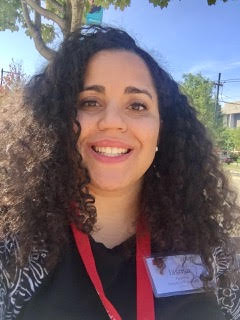Who Is My Interlocutor?: Doing Practical Theology with My Mom
By Jasmin Figueroa, PhD Student in Practical Theology
For the past three years, curious family members, friends, first dates, and prospective students have all asked me variations of the question, “so what do practical theologians actually do?” This shift in conversation has always given me pause, as my analytical brain takes over while I strategize internally over how to respond.While I’ve since learned that it is okay to take a minute to ask clarifying questions, the dozens of conversations that I’ve had about this topic have revealed that lots of people have strong underlying assumptions about what practical theology is and who is allowed to do it. One such belief is that because of my education and training, I have a certain amount of authority to stake theological claims. Another is that practical theology is done only through academic methods, mainly publishing and preaching. While both of these things are true, I cannot help but notice what is implied here: I have the authority to do this important work…and they don’t. Nothing could be further from the truth.
I was not consciously aware of this dynamic until it played out in real life. Over the past few years, without even realizing it, my weekly phone calls with my mom started to follow a pattern. We would start with lighter topics, but would somehow always incorporate theological concepts into the conversation. One week she asked my opinion of Kanye West’s gospel album (she was a fan! She “had googled the lyrics and everything!”) and that led to a conversation about evangelical culture and consumerism. Another time, we commiserated over how the messages about dating that we received as a teenager and recently re-converted divorcée, respectively, didn’t hold up in the face of our lived experiences. Sometimes, she would share what she learned about her coworkers’ cultural backgrounds and how they would encourage, aggravate, confuse, and show up for one another in their own ways. I would offer connections based on what I was learning in school, and before we knew it, we would spend hours teasing apart different scenarios. Although we rarely used theological jargon or name dropped famous thinkers, our conversations would parallel those I’ve had in classrooms and in the community room. Lately, I’ve taken to ending our talks by remarking how she’s my favorite theologian and conversation partner and I wish all precepts could operate with such curiosity and unselfconsciousness. She would laugh softly and go quiet, but I can tell that although she doesn’t quite think of herself as a theologian, she recognizes that what she’s said has been valuable. I don’t push it, but I can relate.
While I am not unaware that my training and placement in the guild does afford me a platform to do a particular kind of practical theological work and lends me more legitimacy (especially in my mom’s eyes), I’m serious when I say that my mom is a practical theologian in her own right. “For Latin@ theologians, there are no insurmountable boundaries between academic scholars and grassroots communities of faith,” writes constructive theologian Loida Martell. She cites Latina evangélica theology, an “abuelita theology,” as an example of this.[1]While she and her co-authors, also trained Puerto Rican women theologians, only recently wrote the book surveying the faith of their foremothers, for Martell, “evangélica theology” simply puts a label on describing what has surrounded them their entire lives. It is a rich faith that centers the lived experiences of people, mainly Latinas, on the margins of society, empowering them to live according to their God-given authority to reject interpretations of scripture that would otherwise support their dehumanization. It emphasizes theological reflection done in community, embraces liberative interpretations of scripture and embodied and experiential forms of wisdom as tools of discernment that are given by the Holy Spirit, and acknowledges its history of ecumenism as an asset in the face of colonization. In short, it is what I grew up with even before I entered formal theological education. It is the praxis of my ancestors, cousins, church ladies, and mom. In short, it ispractical theology.
While my mom laughs and rolls her eyes when I call her a theologian—often while wildly reacting to some profound point that she’s made– I do not actually believe that we are doing much different work from one another. Although, yes, she tends to play up my education as a source of pride, I cannot help but play up hers (learned in the “school of hard knocks,” as she’d say) as equally valuable. Whether she realizes it or not, in our conversations, she is staking important claims, reconciling biblical and theological interpretations with her own lived experiences, and asking important questions. And I wouldn’t be half the theologian that I am without her example.
[1]Martell, Loida I., Elizabeth Conde-Frazier, and Zaida Maldonado Pérez. Latina Evangélicas: A Theological Survey from the Margins. Cascade Books, an Imprint of Wipf and Stock Publishers.
